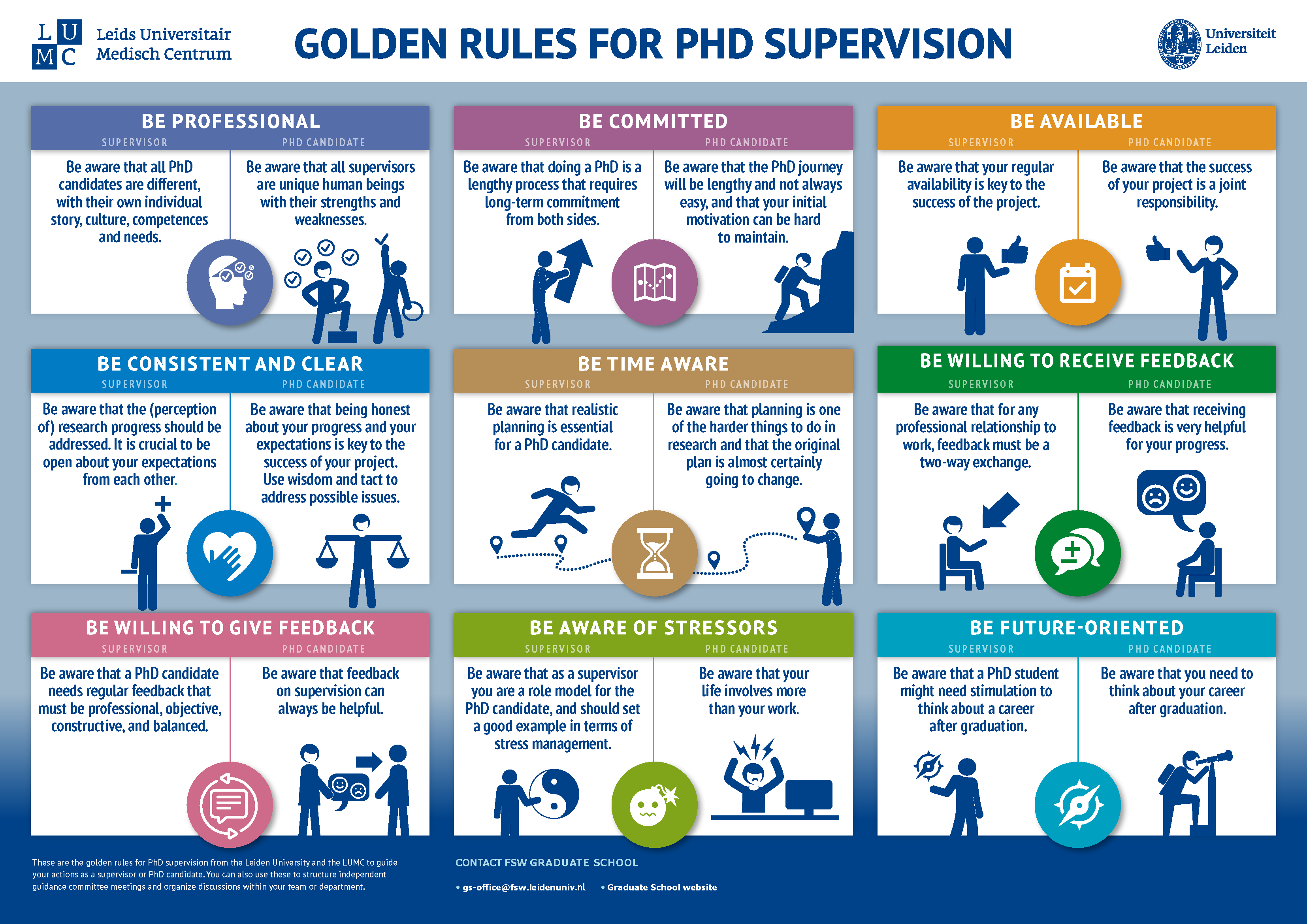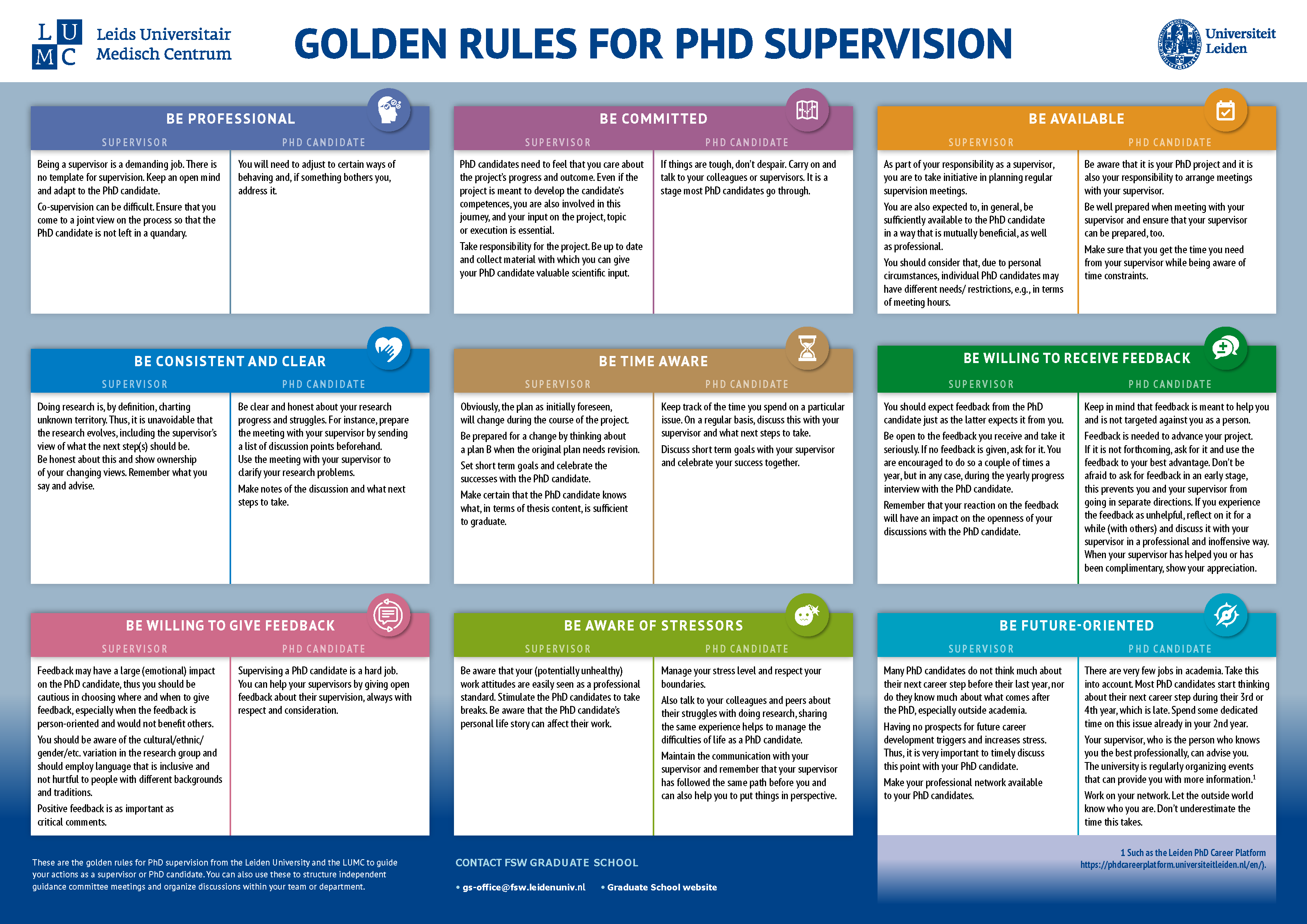
Feeling overwhelmed by your PhD? This new infographic offers guidance
Providing and receiving feedback, meeting deadlines, and simultaneously considering your future: how to juggle all these tasks during a PhD project? The new 'PhD Golden Rules' offer advice on how PhD candidates and their supervisors can collaborate productively.
This week, the infographic 'Golden Rules for PhD Supervision' will be in the mailbox of every PhD student and supervisor. The document advises ways for better cooperation during the PhD trajectory. Promoters and PhDs worked together on the content; LUMC translated it into a handy card. Research director Lotte van Dillen: 'Think of it as a kind of talking card on important topics such as planning and giving feedback.'
The rules emphasise: a good PhD project is something you do together, and requires commitment and mutual understanding from both PhD students and supervisors. Thaddeus Bergé, research policy officer: 'They provide an opportunity to really talk about cooperation at a meta-level: how is the cooperation going now, and what can we improve?'
Open communication as cornerstone of cooperation
The rule 'Be consistent and clear' appeals most to Sara Hondmann, PhD student at the unit of Health, Medical and Neuropsychology. 'Open communication is essential to me, I think it is even the cornerstone for collaboration during your PhD,' she says. The rule 'Be future-oriented' had not been on her radar before. Until now. 'I haven't put much energy and time into it yet because all my focus is on research and teaching. In the coming time, I want to start thinking concretely about the future after my PhD and discuss this with my team.'
Emailing on weekends
Marieke Adriaanse, professor of Behavioural Interventions in Population Health: 'To me, the rule 'Be aware of stressors' appeals the most. As a supervisor, you have to realise that you are a role model, that with your behaviour you set a standard for others. For instance, you can state that you don't expect PhD students to respond to emails outside of working hours or during holidays, but if you consistently do so yourself, the impact of your statement is limited. In doing so, you convey the message that it is, in fact, the expectation.'
'As a supervisor you are a role model, with your behaviour you set a standard for others' - Marieke Adriaanse
There is also a dilemma there, according to Adriaanse. 'Supervisors themselves experience pressure and grapple with their work-life balance,' she notes. 'By pretending that we never work in the evenings and manage to complete all our tasks beforehand, we establish an unattainable standard. The best solution? I believe it's best to embrace vulnerability, be honest about what you struggle with, and share how you cope with it. That's what I strive to do myself.'
(Un)clear expectations
As Graduate School Officer, Ina Schabram provides support to PhD students and supervisors. For example, she organises Meet Your Graduate School meetings where she clarifies the formal aspects of the policy for PhD students and PhD supervisors. 'During my own PhD, there were few rules and conditions; I had to figure things out on my own. If the Golden Rules had been in place back then, they would have helped me in seeking feedback. There was no official moment to discuss the quality of supervision; we did that with fellow PhD. candidates. A clear plan at the beginning of the project would have been beneficial; it gives you a sense of what's expected.'
'A clear plan at the beginning of the PhD process would have helped me' - Ina Schabram
Why PhD policy matters
In recent years, universities, and thus also the Institute of Psychology, have paid more attention to PhD policies. This was not a priority at first, Van Dillen and Bergé also experienced themselves during their PhD. Van Dillen: 'I started the process blank, there were no frameworks at all. There were research schools and, coincidentally, PhD meetings were a local tradition when I did my PhD, but when I started here as research director, that kind of initiative was not in place.'
Bergé: 'As a PhD student, you find yourself in a somewhat intermediate position. You are no longer officially a student and are regarded as autonomous by your surroundings, yet you remain in a dependent relationship with your supervisor. Within this dynamic, you learn what's considered normal and how things are best done, but it can also create a sort of isolated environment.' Van Dillen adds, 'Consequently, there's a risk that individuals might only feel comfortable speaking up about potentially inappropriate behavior by their supervisor after they've completed their PhD.'
Change in progress
Now this is slowly changing. With the Golden Rules, but also, for example, with a mentor system, which allows conflicts and misunderstandings to come to light more quickly. 'This also makes it clear which challenges PhD students, but also their supervisors, encounter,' says Van Dillen. In addition, there is now a system of PhD representatives: PhD students from each unit are represented by a young colleague and can thus exchange knowledge with each other.
'Without a good PhD policy, you run the risk of people only speaking out about inappropriate behaviour by their supervisor after completing their PhD' - Lotte van Dillen
Finally, the Executive Board of the Institute of Psychology is working to equalise the rights for all types of PhD students. Van Dillen: 'At the moment, as a PhD student on a scholarship or outside the university, you don't have annual interviews because you are not in the HR system. We are in the process of equalising that, so that soon all PhD students will be able to have R&O interviews.'
Professors of tomorrow
Ina Schabram is delighted that so much action is being taken on PhD policy. 'Today's PhD students are tomorrow's scientists and professors. But the PhD trajectory is a vulnerable moment. PhD students are dependent on their supervisor and also have to conduct research independently. This is always a friction point where turmoil and uncertainty can arise. It is also important that the supervisor is properly trained to support the PhD students in the best way. This way, they can develop into good scientists and make a positive impact.'


